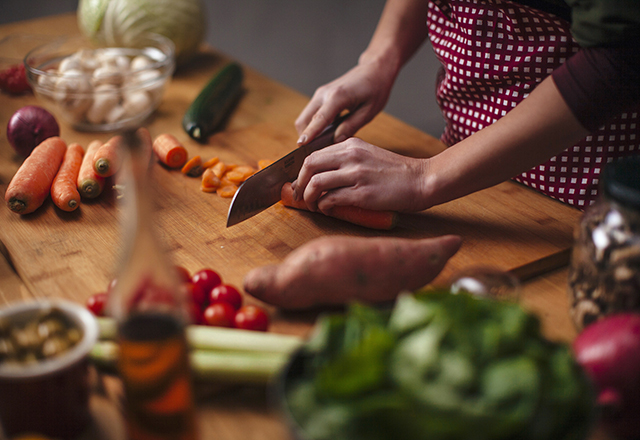It all started with chopping carrots one late night. The irregular rhythm of the sound of the knife hitting the cutting board betrayed my clumsy skills. The bright orange pieces, inconsistent in size, confirmed it. But it didn’t matter. Once in my stomach, that imperfection would transform into nutrients and energy. As the pile of pieces grew, the sense of emptiness and anxiety from a day where I felt I hadn’t accomplished enough began to fade away. If someone had told me a few years ago that I would find peace in cooking, I wouldn’t have believed them.
Before living alone, I rarely cooked. Growing up with my family in the same city where I studied and worked, I benefited from the “mom advantage”; I never really had to prepare my own meals. But more than that, I had convinced myself that cooking wasn’t my thing.
This belief came from my first attempt at cooking during elementary school, which ended in complete failure. The egg I had cracked at the wrong time, in the wrong way, dissolved into shapeless fragments, and the broth turned out disappointingly bland. How could I mess up something as simple as instant ramen? From that experience, I concluded that cooking was best left to those who were good at it. Over time, this belief only solidified as my rare cooking attempts continued to yield unimpressive results.
Everything changed when I moved to Baltimore and started living alone. Everyday tasks that I had once taken for granted suddenly turned into personal challenges. Cooking, in particular, became unavoidable. I had to feed myself somehow. Eating out wasn’t always an option, not just because of the expense but also because of my preference for lightly seasoned dishes with plenty of fresh vegetables. Most vegetables, however, came in quantities that a single person couldn’t consume easily. So cooking meant washing, peeling, chopping and dividing them into small portions for longer storage.
Then came the revelation. One late night after work, I opened the refrigerator looking for something refreshing and found a bag of untouched carrots. With barely a thought, I found myself at the cutting board, chopping away. As the pieces of carrots accumulated, I noticed something strange — I felt more relaxed. This was significant, because my days had become filled with a new kind of uneasiness. As a newcomer to basic biomedical research working with cells and animals — after years in clinical practice where I interacted with patients face-to-face — I was unaccustomed to new days without immediate visible results.
Cooking, on the other hand, gave me something tangible immediately. I could chop, stir, season and, within a short time, I had something complete: a dish I could taste and enjoy. Most dishes were edible and frequently even tasty, unlike in my earlier attempts. It was satisfying in a way I hadn’t expected. Cooking requires handling knives and fire, planning the order of steps and taking immediate action. The roughness of chopping ingredients and the orderliness of following steps demanded focus — a focus that pulled me away from overthinking and rooted me firmly into the present moment. The repetition of simple tasks, the transformation of raw ingredients, and the rewarding final product all made the whole experience meditative.
What I also appreciated was how cooking allowed for imperfection. Mistakes weren’t catastrophic; poor seasoning was not a life-threatening failure. Cooking soon became more than just preparing meals — it became a form of stress relief with immediate rewards for my time and effort and a mirror reflective of my daily experiences.
Now when I stand in my kitchen chopping carrots, I’m in a moment of peace amid the uncertainty. It’s no longer just about making food; it has become a small, daily act of self-care — one that reminds me that, even when life feels out of control, I can still create something nourishing and meaningful with my own hands.
Related Content
- Why Cooking Is Like Surgery
- Cooking for One: Chinese Food Edition
- Balancing Business, Books and Jollof Rice
Want to read more from the Johns Hopkins School of Medicine? Subscribe to the Biomedical Odyssey blog and receive new posts directly in your inbox.

Wonderful restorative piece to read and contemplate - thank you!
I like this 🙂 Thanks for sharing your peace on cooking!
Comments are closed.